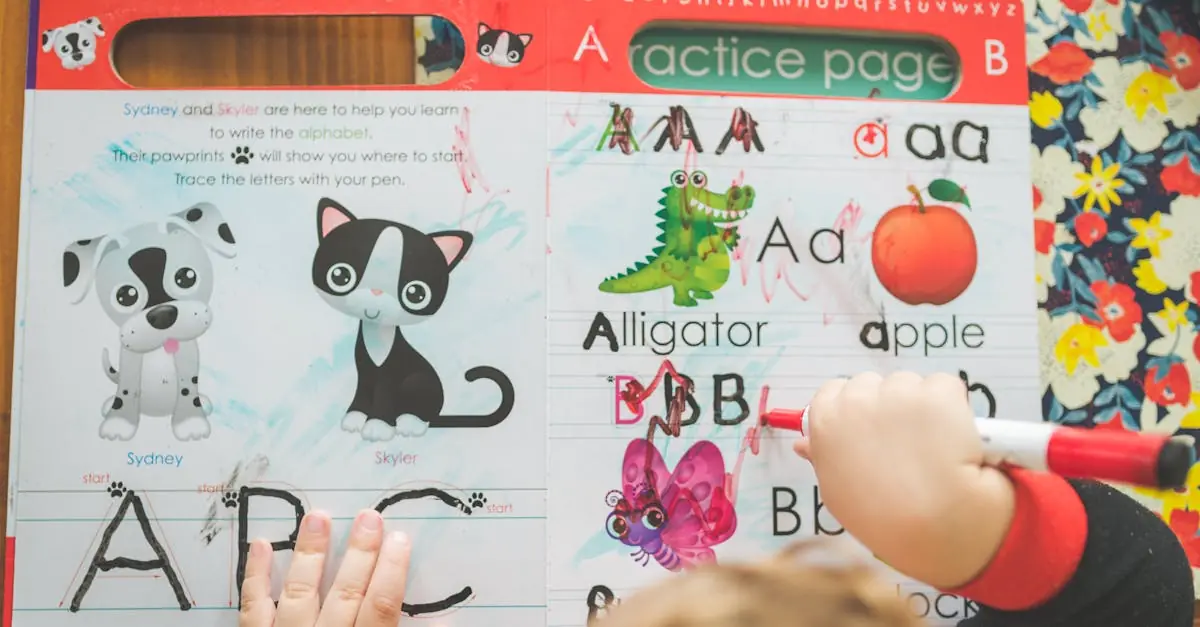In a world where every scribble matters, a letter tracing book for preschoolers is like a magical wand for budding writers. These colorful pages invite little hands to embark on an exciting adventure, transforming wobbly lines into confident letters. Who knew that learning to write could be so much fun?
Table of Contents
ToggleOverview of Letter Tracing Books
Letter tracing books serve as essential resources for preschoolers learning to write. These interactive tools incorporate colorful designs to capture children’s attention and motivate them to practice. Engaging pages often feature alphabets alongside illustrations to connect letters with familiar objects.
Children benefit from using tracing books as they enhance motor skills. Tracing letters helps develop hand-eye coordination critical for writing. Simple yet effective exercises enable preschoolers to refine their grip, improve control, and gain confidence as they progress.
Educators recommend incorporating varied activities within these books, such as connecting dots and following arrows. These activities promote cognitive development while keeping learning fun and engaging. Additionally, incorporating sensory elements, like textured pages, can further enrich the learning experience.
Parents and teachers should prioritize consistency in using letter tracing books. Regular practice supports language acquisition and literacy development during early childhood. By integrating storytime with letter practices, caregivers can reinforce recognition of letters through repetition.
Research shows that children who engage consistently with letter tracing books often demonstrate improved writing skills. Mastering letter formation at an early age sets a solid foundation for future literacy. The excitement of mastering each letter encourages preschoolers to take pride in their writing journey.
Importance of Letter Tracing for Preschoolers
Letter tracing serves as a critical learning tool for preschoolers. Engaging in this practice offers numerous benefits that lay the groundwork for writing skills.
Enhancing Fine Motor Skills
Letter tracing enhances fine motor skills essential for writing. Gripping a pencil or crayon while tracing letters helps children develop hand strength. Coordinating movements improves dexterity, allowing for smoother writing later on. Tracing exercises also promote control over hand muscles, making it easier to form letters accurately. Regular practice ensures these skills become second nature for young learners.
Building Foundation for Writing
Building a foundation for writing begins with letter tracing activities. Recognizing shapes of letters helps preschoolers understand how to form them properly. Familiarity with letters increases confidence, setting the stage for future writing endeavors. Early engagement fosters a love for writing and literacy, making learning enjoyable and impactful. Establishing this foundation leads to improved writing capabilities as children grow. Addressing these key areas ensures preschoolers thrive when they transition to more complex writing tasks.
Features of a Quality Letter Tracing Book
Quality letter tracing books for preschoolers include several important features that enhance the learning experience.
Engaging Illustrations
Engaging illustrations capture children’s attention and spark their imagination. Bright colors and fun characters connect letters to familiar objects, making learning enjoyable. Each page can present vibrant images that children recognize, linking them to the letters they trace. Such connections reinforce cognitive associations, making it easier for young learners to remember letter shapes. Seeing engaging visuals motivates preschoolers to practice writing, transforming the process into a playful activity.
Clear and Simple Layout
Clear and simple layouts ensure that preschoolers can focus on tracing without distractions. Each page contains ample space for little hands to navigate as they practice letter formation. Consistent formatting across pages helps children know what to expect, promoting confidence in their writing. With thoughtfully arranged sections, young learners can clearly distinguish each letter’s starting and ending points. Simplicity in design creates an inviting environment for developing writing skills.
Progress Tracking
Progress tracking features allow parents and teachers to monitor children’s development. Some books include checklists or charts that help track completed letters and exercises. By visualizing their achievements, kids gain a sense of accomplishment. Monitoring progress also identifies areas needing more practice, ensuring targeted support. Regular assessments can encourage consistency, fostering a routine that reinforces letter recognition and handwriting skills.
Benefits of Using a Letter Tracing Book
Letter tracing books offer significant advantages for preschoolers learning to write. These resources not only make writing fun but also cultivate essential skills.
Boosting Confidence in Writing
Letter tracing promotes confidence in writing by allowing children to practice without pressure. Each completed letter adds to their sense of achievement. Children often enjoy seeing their progress, reinforcing their motivation to continue practicing. Positive reinforcement encourages them to express themselves more freely. Celebrating small accomplishments builds their self-esteem and eagerness to tackle new challenges. With consistent practice, children transition from uncertainty to comfort in writing, paving the way for future success.
Encouraging Early Literacy Skills
Engaging with letter tracing books fosters early literacy skills. Recognizing letters and understanding their forms is crucial during preschool years. Children develop phonemic awareness through tracing exercises. Exposure to letters in various contexts aids in familiarizing them with early reading concepts. Creating connections between letters and objects enhances vocabulary retention. By recognizing letter shapes, children build a foundation for effective reading and writing. Consistent tracing practice strengthens motor skills, which play a vital role in literacy development. Overall, these skills set the stage for a lifelong love of reading and writing.
A letter tracing book is an invaluable resource for preschoolers embarking on their writing journey. By combining fun with learning these books help children develop essential skills while boosting their confidence. The engaging illustrations and interactive exercises not only capture attention but also foster a love for literacy.
Regular practice with these tracing books lays a strong foundation for future writing tasks. As children progress they’ll celebrate each small achievement reinforcing their motivation to learn. Embracing this playful approach to writing ensures that preschoolers are well-equipped for the challenges ahead while nurturing their creativity and self-expression.



